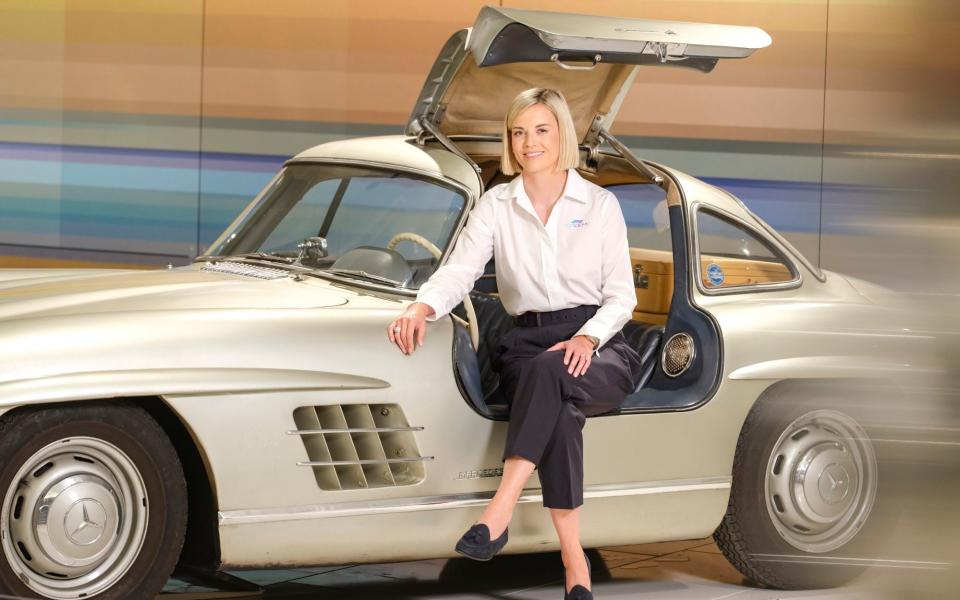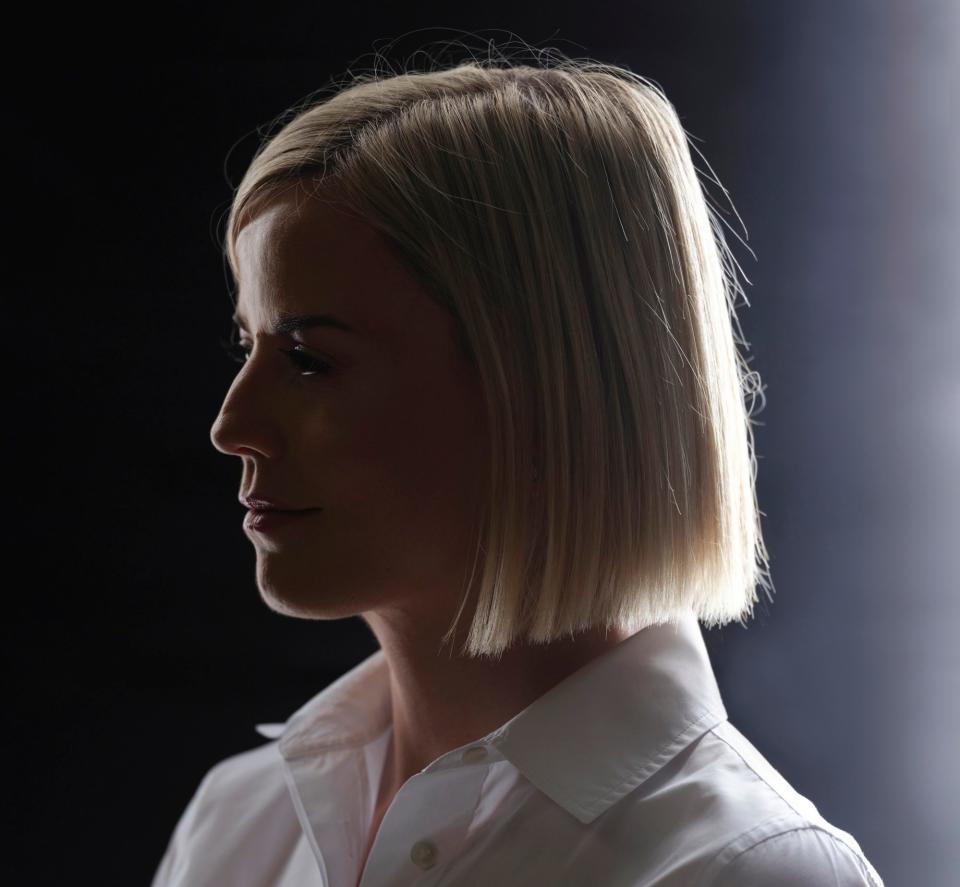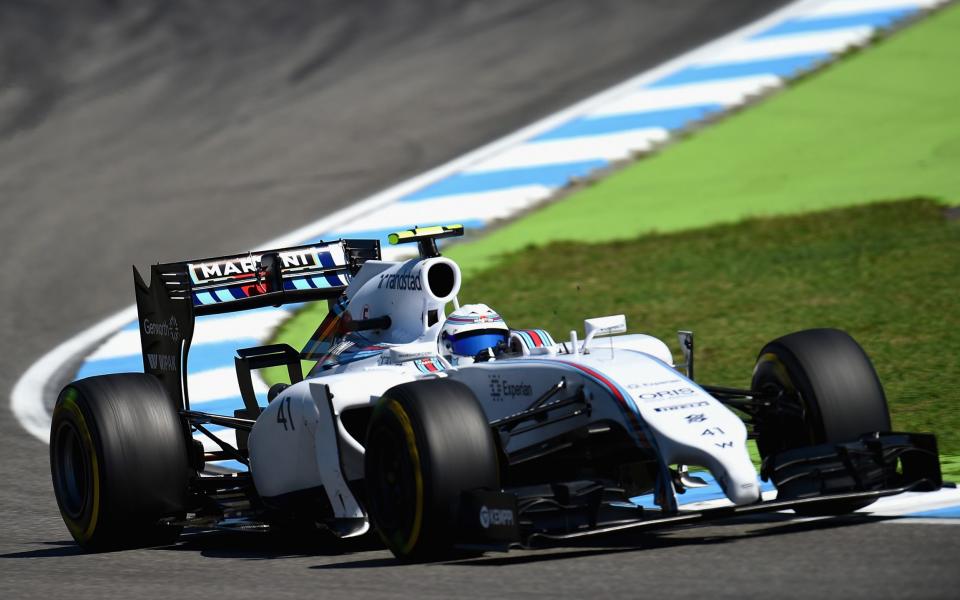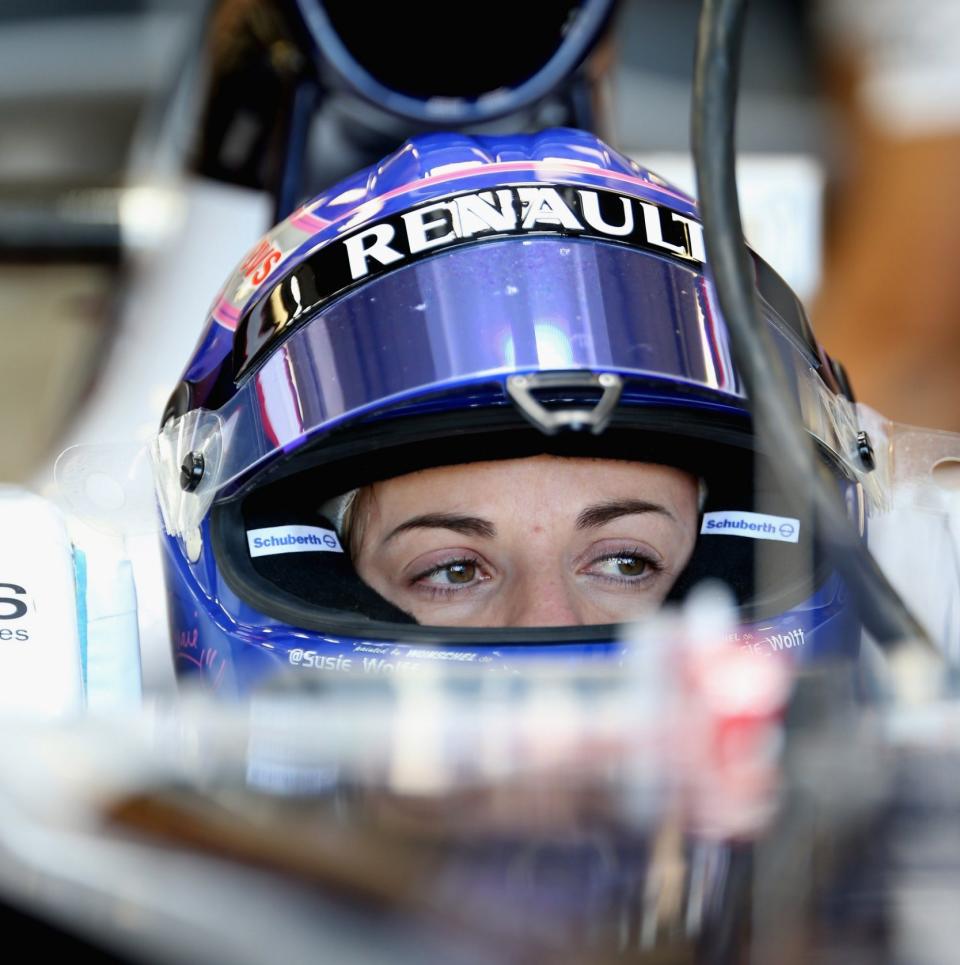Former test driver Susie Wolff: ‘There’s still a stigma to being beaten by a girl’

This weekend, all the major movers and shakers in Formula 1 have descended on Silverstone for the British Grand Prix. On track, seven-time world champion Lewis Hamilton will attempt to slow Max Verstappen’s seemingly inexorable charge towards a third successive title. Off it, their respective team principals, Mercedes’ Toto Wolff and his nemesis, Red Bull’s Christian Horner, will also do battle: sniping in the press, competing for talent, positioning their teams for this season and beyond.
But arguably the most significant power move made in motorsport this week may already have taken place. Its architect was none other than Susie Wolff, wife of Toto. And just quietly, she is hoping she may have triggered a revolution.
Wolff, née Stoddart, is a Scottish ex-racer well known in motorsport not for being Toto’s other half, but for the fact that she was once a test driver for the Williams team. The 40-year-old only drove in a handful of test and practice sessions, but in doing so came as close as any female has in almost 50 years to actually competing in the sport. Not since Lella Lombardi raced in Austria in 1976 has a woman actually started an F1 grand prix. And only Lombardi and fellow Italian Maria Teresa de Filippis have raced in motorsport’s top category since the championship began in 1950.
Wolff is hoping to change that. As managing director of F1 Academy, a new all-female single-seater series, she is currently thrashing out what she believes could be a ‘game-changing deal’ with F1’s 10 teams, which she hopes will boost female participation in motorsport like nothing before.
Leaning back in a chair in the library of the uber-exclusive Monaco Yacht Club, sunshine glinting off the luxury boats bobbing about in the harbour behind us, Wolff lets out a snigger. ‘It’s true,’ she nods. ‘He really did once describe me as a donkey!’ We are talking about her husband, Toto Wolff, one of F1’s biggest personalities and star of Netflix’s hit docu-series Formula 1: Drive to Survive.

The donkey reference actually cropped up in an interview the couple gave to Ben and Georgie Ainslie’s Performance People podcast last year. Discussing their contrasting personality types, Susie revealed that Vienna-born Toto had once likened himself to an Arab racehorse – ‘a very high performer’, but skittish – whereas she was more of a donkey. ‘I didn’t say you were a donkey!’ he protested. ‘There are these workhorses in Austria called Haflinger. They are on the mountains… They have these furry legs. They go and go…’
In the YouTube version of the podcast, you can see Susie, by this point in hysterics, miming someone digging a hole ever-deeper. The exchange is a window into their relationship: playful, loving, with Susie giving as good as she gets. But it also says something about both of their characters. Toto is a high performer, there is no doubt about that. Forbes named the Austrian, who owns one-third of the Mercedes F1 team, a billionaire in its most recent Rich List. And Susie? Well, ‘donkey’ may be a bit harsh for a woman who once gave Hamilton a run for his money in karting. But she knows what her husband meant. ‘Don’t underestimate the donkey,’ she says, grinning. ‘It gets there in the end. I do have a lot of tenacity.’ She is going to need it in her latest role.
There have been various attempts down the years to drive female participation in motorsport and achieve the ultimate breakthrough: returning a woman to the F1 grid. Wolff believes F1 Academy is different. For starters, it is the first all-female series launched and owned by Formula 1 itself. That means it is in F1’s interests for it to succeed. So whereas W Series, for instance, the previous (and much-hyped) all-female series that lasted three seasons before going bankrupt this year, was given an enviable platform by the sport – granted one of F1’s coveted ‘support series’ slots at grands prix around the globe – the fate of F1 Academy is far more intertwined with the brand.
Not only will it compete on the F1 circuit from next season, but the two series will collaborate far more closely. Wolff cannot speak just yet about what that might look like, as the finer details are still being ironed out. Suffice to say there are some very exciting plans in the offing that she hopes to announce soon. ‘I think there are some forward-thinking team principals in Formula 1,’ she says. ‘I certainly feel a real commitment from within the paddock to help change things now.
‘When I met them all after my announcement [at the season opener] in Bahrain, I said to all of them, “Please don’t think of this as a ‘woman’s thing’ being run by a woman. This is for the greater good of this sport. I hope it will add value to Formula 1 long-term. And we need to be on this journey together.” So far, the response has been very positive, I have to say.’
Wolff smiles. ‘But F1 Academy cannot just be about 15 young women racing. And we cannot have the sole purpose of trying to find the next female F1 driver. We have to stand for something much more. It’s about creating opportunity. How are we making motorsport accessible to girls? That’s why I’m spending a lot of my time in the world of karting right now, trying to understand, OK, who’s out there racing? At what level? What is stopping girls from racing? I think that’s where we’ve got to be really proactive. Because that talent pool is what we need to grow.’
Wolff is uniquely well-placed to do so. Born in Oban, in the West Highlands, she had a typically outdoorsy upbringing. Both she and older brother David, 18 months her senior, were put on skis and bikes as toddlers. Her parents, John and Sally Stoddart, owned a motorcycle dealership and her father raced bikes competitively, so racing was ‘in the blood’. But, Wolff says, she was ‘never a typical tomboy’. ‘I had my Barbie. I had my dolls. I liked that stuff. But I also loved going fast. I remember going to watch my dad race in Knockhill. They had this little go-kart track and my brother and I would be pestering him the whole weekend. It was £5 for 10 minutes and we’d be like: “Can we go again? Can we go again?”’

Eventually the family got a second-hand kart and that was it, although Wolff insists it was just ‘for fun’ until she was taken to a Formula 3 race at Donington Park one year and watched Jenson Button win. ‘That’s when I was like: “This is what I want.” After that I started racing in the European and world championships.’
It was at that point, too, that Wolff began to experience sexism for the first time. She had always been ‘the only girl’ in karting races. Or at least one of very few. But as her participation became more serious, so too did the feeling of being not just different but unwanted. ‘Funnily enough, half of my battle was with the parents of my competitors,’ she recalls. ‘For them, it was not wanting their sons to get beaten by a girl.’
Sometimes her own teams, supposedly on her side, were just as culpable. When she reached DTM, the German touring car championship, Wolff was famously made to drive a pink car. ‘I hated it,’ she says. ‘It was such a cliché. No one wanted to be overtaken by that car.’
Wolff recalls one particularly awkward episode when three-time F1 world champion Niki Lauda came to watch his son Mathias. ‘Mathias and I were teammates and it was a real thrill that Niki was coming to watch,’ she says, wincing. ‘So anyway, he walks into the garage, and all the drivers were in there, and without even saying hi to Mathias or anything, he took one look at me and said to Mathias: “Whatever you do, beat her.” Even Mathias was embarrassed.
‘Years later, when we obviously became friends at Mercedes [Lauda was the team’s non-executive chairman], I brought it up and Niki was like, “Yeah, I know. But I knew it wouldn’t have been helpful to Mathias if he got beaten by you.” I said, “But Niki, I was an impressionable young driver.” Obviously he was of a certain generation. But I think that still exists. That stigma. Not wanting to be beaten by a girl. The preconception that women are bad drivers. We have to change that.’
“We’ve seen such a growth in women’s sports, which has taken a long time but is now really gaining momentum.'@Susie_Wolff spoke to @NaomiSchiff on @SkySportsF1 on the importance of F1 Academy. 🗣️#F1Academy pic.twitter.com/mebLn928fm
— F1 Academy (@f1academy) June 16, 2023
For the record, Wolff believes there is nothing to stop women being as fast as men in F1. The heavy loads on the neck from the G-forces encountered by drivers have been cited as a potential limitation for women, but F1 uses power steering. Wolff was capable of building up the necessary neck strength. It is junior categories such F3 and F2, traditionally the gateway to F1, that pose more of an issue physically, since they do not have power steering. Wolff is petitioning the FIA, motorsport’s governing body, to get those categories to fall in line. ‘If the pinnacle of the sport is using power steering, why are we putting obstacles in the way, not just for female drivers, but for smaller, lighter male drivers?’ she says.
In other times during Wolff’s career it has been double standards that infuriated her. Male drivers could advertise products or cash in on their celebrity. But when Wolff did the same she would be accused of ‘using her body’ to further her career. This is someone who had, and still has, a genuine interest in fashion. ‘It was frustrating,’ she admits. ‘I turned down loads of things. I remember being questioned about one shoot, with Vogue Japan. “What? You’re going to turn down Vogue? No! It’s one of the top titles…”’
Wolff did a couple of racier shoots but never anything she was not completely comfortable with. She praises American ex-IndyCar driver Danica Patrick, a regular in Sports Illustrated’s swimsuit issues, for leveraging her marketability. ‘If anything, I look back and think my USP was my gender and I didn’t play that card enough,’ Wolff says. ‘I think Danica did a great job. She became a household name because she managed to get the marketing side but also the on-track performance. She won an Indy race, she fought the Indy500 at the front.
‘Ultimately, I think it’s about finding a balance and doing what you’re comfortable with. I had one golden rule. I would never date another driver. I wanted to look after my reputation and just be someone that was seen as credible. But I think this idea that you just put your helmet on and race and nothing else matters… that’s not the case. Take Lewis. What he brings to the table is his outstanding talent on track. But also, all of the stuff he represents off-track. So if anything, I look back and say, I should have gone even harder.’
Does she believe she was held back? Wolff shakes her head. ‘I think I fulfilled my potential. If I look back now, with more perspective, I wasn’t one of the most talented. I had a lot of tenacity and a lot of determination. A lot of thick skin. So I look back with no bitterness whatsoever. There were a lot of tough moments, I won’t lie. But I also met Toto, which led me to where I am now.’
They met in 2009 when Wolff was competing in DTM. Toto, 11 years her senior and with two young children from a previous marriage, was the co-owner of HWA AG, which ran the DTM race programme for Mercedes. He proposed one year later on a boat in Venice (well, on a boat back to the airport after his original plan to propose at a romantic restaurant was scuppered when a couple they knew sat down at the next table) and they were married in Capri in 2011.
Inevitably their relationship, her subsequent role at Williams (where Toto was a shareholder), and rise through senior management positions at Venturi Racing, a Monaco-based Formula E team, to F1 Academy, have led to allegations of nepotism.

‘I am completely fine with that because in the end, I know the truth,’ Wolff says. ‘I got the drive with Williams after I met [team principal] Frank at a DTM event at Brands Hatch and told him I’d done a school project on Williams as a 12-year-old girl – which was true, my mum actually found it the other day – and it was always my dream to drive an F1 car. At the end of the conversation he said, “I’ll give you 25 laps at Silverstone.” It kind of snowballed from there. How much of that was Toto? It’s impossible to judge. But I feel I grabbed my chance.
‘Toto was never on the radio telling me how to drive a Formula 1 car. He wasn’t holding my hand telling me how to run a Formula E team. I did all of that on my own two feet.
I know I’ve got what it takes to be successful, I don’t need Toto to open doors for me.’ She pauses. ‘I think in some instances, it can be very helpful having the Wolff surname, in others very unhelpful. But I wouldn’t change it for a second.’
Marrying up their schedules can’t be easy. The couple’s main home is in Monaco, but when we meet, Toto is back at the factory in Brackley, Northamptonshire, having just returned from the Canadian Grand Prix. He will fly out to take over parental duties from Susie – they have one son, Jack, who is six – when she heads to Zandvoort at the end of the week. ‘I don’t think we’re dissimilar to many couples who have busy jobs,’ Wolff says. ‘I have Toto’s schedule on my phone so I always know which country he is in, or at least when he’s coming home. And we just have to prioritise. If that means Jack and I jumping on a plane to wherever he is to make it work, we make it work.’
Wolff admits it is her who generally compromises. ‘Someone has to,’ she shrugs. ‘And right now it’s me, for sure. I’m based here. And Toto is in and out. It’s a big advantage that I understand the industry so well; why he has to be away, why he has to stay longer at the factory. All of that means I’m not giving him a headache at home when he does return. I get it.’

Have Mercedes’ recent struggles on track made things more stressful? ‘Actually I’d say he is in a better place than he was a few years ago,’ Wolff replies. ‘I think he had a moment in lockdown where he didn’t know whether he wanted to stay in the sport. But now he has really got the bit between his teeth again. Sometimes I’m in a room when he’s on a very difficult call and I’m starting to feel, “This is some serious pressure!” But he can just pile it on. It’s definitely one of his strengths.’
In 2021 the couple moved to Monaco from Switzerland, although they also keep a place in Oxford from which Toto can commute to the factory. ‘Believe me, I never imagined I would be living here,’ Wolff says, laughing. ‘Obviously I started coming out a lot when I joined Venturi. I’d leave cold, grey England and land here in blue skies. I just started thinking, it’s not so bad out here… It works for us now.’
As you would expect, Jack attends a school with the sons and daughters of other international jetsetters. ‘His best friend is [BMW driver] Augusto Farfus’ son. Naila Rosberg is a year older, her sister is a year younger,’ Wolff says. But really, she insists, they do not have a lavish lifestyle. ‘My son spends every school holiday back in Scotland because I want him to have that balance. You know, this is a bubble. It’s not quite reality. So he goes camping with my parents.’ As for the Monte Carlo nightlife, Wolff says, ‘We keep ourselves to ourselves. The buzzing social life is just not my thing at all. You find your tribe but we spend so much time away, I’d much rather stay in during the evening than go out somewhere.’
F1’s ultimate power couple, spending their evenings watching Netflix like the rest of us? ‘I haven’t actually watched Drive to Survive since Abu Dhabi 2021,’ Wolff says, referring to the biggest controversy of the modern F1 era when Hamilton was denied a record eighth world title by a wildly controversial race director call on the final lap of the final race.
‘I knew what the narrative was going to be [last year]. And I just didn’t need to watch it. Besides,’ she adds, ‘we’re doing our very own docu-series on F1 Academy. Hello Sunshine, Reese Witherspoon’s company, is producing. They’ve already done the pilot. So move over Drive to Survive.’
Do not underestimate the donkey. It gets there in the end.

 Yahoo Sport
Yahoo Sport 





































